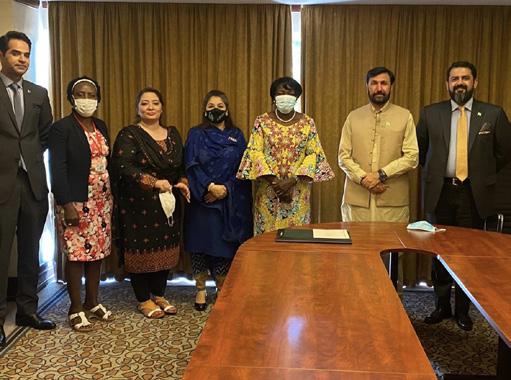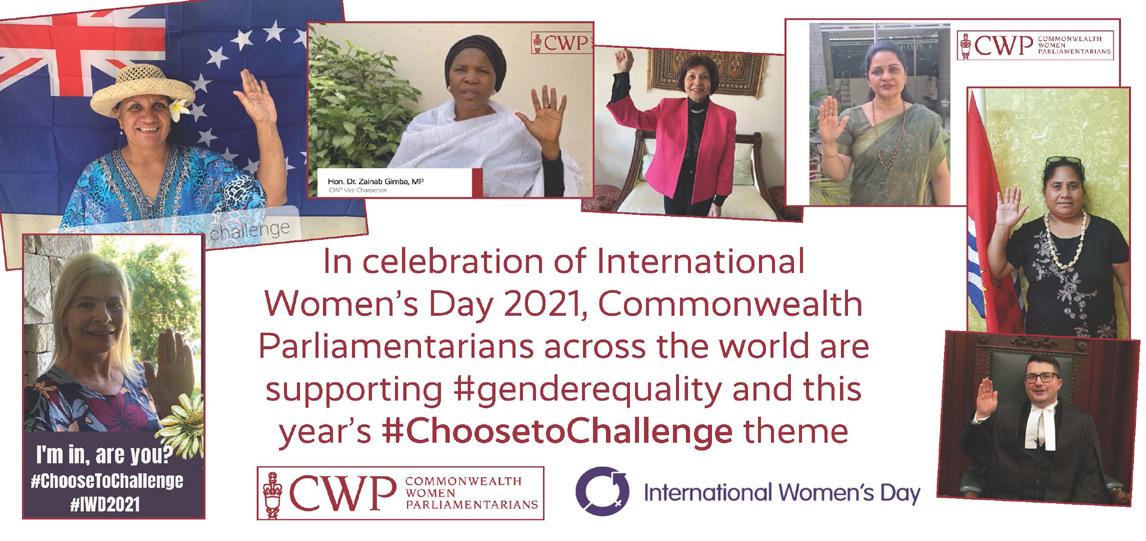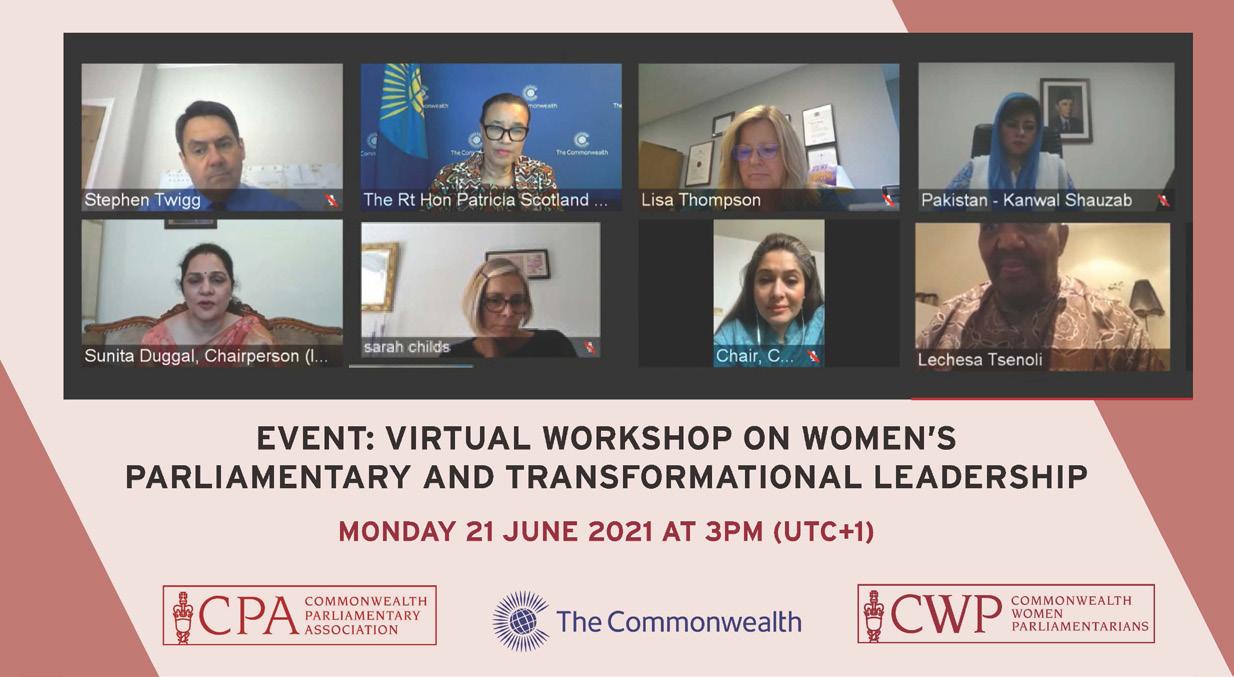
5 minute read
COMMONWEALTH WOMEN PARLIAMENTARIANS (CWP)
The Commonwealth Women Parliamentarians (CWP) seeks to work for the increased representation of women in Legislatures and for the furtherance of gender equality across the Commonwealth. Furthermore, the CWP seeks to ensure that gender continues to be mainstreamed across all activities to assist Legislatures to exceed the Commonwealth target of at least 30% of women in decision making positions across all representative bodies.
A CWP Steering Committee of 11 Members of Parliament, which includes one representative from each of the nine CPA Regions plus the CWP President and CWP Chairperson, plan the CWP’s annual activities. The CWP Chairperson serves a term of three years and the CWP President serves for one year.
CWP CHAIRPERSON HIGHLIGHTS GENDER EQUALITY AND SDG5 IN UGANDA

The current Chairperson of the Commonwealth Women Parliamentarians, Hon. Shandana Gulzar Khan, MNA (Pakistan) met with the former CWP Chairperson (2013-2016) Rt Hon. Rebecca Kadaga, MP, the First Deputy Prime Minister of Uganda and a former Speaker of Parliament to discuss gender equality and achieving SDG5. The meeting took place in the margins of the African and Asian Parliamentarians’ Meeting on the ICPD25 Commitments that took place in Kampala, Uganda from 17 to 19 August 2021. Hon. Shandana Gulzar Khan led a six-person delegation from the National Assembly of Pakistan to the conference which was attended by representatives of 24 countries to discuss Agenda 2030, population development, maternal health as well as Sustainable Development Goal 5 on Gender Equality.
COMMONWEALTH WOMEN PARLIAMENTARIANS SUPPORT #CHOOSETOCHALLENGE ON INTERNATIONAL WOMEN’S DAY 2021
Women Parliamentarians from across the Commonwealth mobilised behind the #ChoosetoChallenge slogan to mark International Women’s Day 2021. Members of the Commonwealth Women Parliamentarians (CWP) network joined the global campaign to challenge gender bias and inequality, to celebrate women’s achievements and to help create an inclusive world. In celebration of International Women’s Day, the CWP Chairperson, Hon. Shandana Gulzar Khan, MNA (Pakistan) published a #ChoosetoChallenge video message and the CWP network has also released a series of short videos online and on social media, offering an insight into the life of women Parliamentarians across the Commonwealth and their efforts to facilitate the empowerment of women at every level of society. Women MPs featured from Nigeria; India; Ontario, Canada; Cook Islands; St Lucia and Malaysia.
In the lead up to the day, the CWP network also launched a social media campaign highlighting women Speakers of Parliament in the Commonwealth. Women are significantly under-represented in leadership positions within Parliaments, comprising only 20% of Speakers globally. The CPA is proud to have welcomed many women Speakers and Deputy Speakers to its events over the years, and a number of women Speakers have also taken on governance positions within the CPA and CWP.
Reflecting on how Parliamentarians of all genders can choose to challenge gender inequality, the CWP Chairperson stated: “Parliamentarians are uniquely placed to challenge gender inequality and bias. The emphasis here is on choice. We must choose to involve women at every stage of the legislative process, we must choose to produce gender-sensitive budgets and we must choose to stand against harassment of women in public, in the workplace and online. Happily, the Commonwealth Women Parliamentarians network has continued to work, during the COVID19 pandemic, to improve representation of women in elected office and build the capacity of women Parliamentarians as current and future leaders.”
International Women’s Day is a global day celebrating the social, economic, cultural, and political achievements of women. The day, first celebrated in 1911, marks a call to action for accelerating women’s equality. The Commonwealth Women Parliamentarians (CWP) network was founded in 1989 to increase the number of women elected representatives in Parliaments and legislatures across the Commonwealth and to ensure that women’s issues are brought to the fore in parliamentary debate and legislation.

AMPLIFYING VOICES, BUILDING RESILIENCE AND LEADERSHIP: COMMONWEALTH WOMEN PARLIAMENTARIANS LEAD GLOBAL DISCUSSIONS ON WOMEN’S PARLIAMENTARY AND TRANSFORMATIONAL LEADERSHIP
Commonwealth Women Parliamentarians from the CWP International Steering Committee participated in two webinars organised by the Commonwealth Secretariat on Women’s Parliamentary and Transformational Leadership. The online webinars were designed to critically reflect on gender sensitivity in Parliaments and the significance of women’s parliamentary and transformational leadership in fostering equitable development in the Commonwealth. Panellists shared their knowledge, first-hand experience and examples of best practice on matters relating to barriers to women’s representation and effective leadership and the challenges and strategies needed to encourage the retention of women in Parliament. The webinars were attended by Parliamentarians, parliamentary staff, academics, experts, international organisations and members from civil society organisations from across the Commonwealth.
In his opening remarks, the CPA Secretary-General, Stephen Twigg encouraged Parliaments to actively engage in the process of sharing best practices to ensure that they strengthen their institutions and support women in Parliament and strive for the exceptional to become the normal. The Commonwealth Secretary-General, Rt Hon. Patricia Scotland QC re-echoed this sentiment and said that ‘Parliaments should lead the way for greater equality and inclusivity’ and should ultimately ‘act as engines of change’.
The CWP Chairperson, Hon. Shandana Gulzar Khan, MNA (Pakistan), addressed the barriers that women in the Commonwealth face upon their entry into politics, into Parliament and when rising to leadership positions within society. The CWP Vice-Chairperson, Hon. Dr Zainab Gimba MP (Nigeria), confronted the hurdles that women Parliamentarians can face when accessing Parliament and the challenges they also face when trying to carve out their own space and gain influence in the policymaking process.








